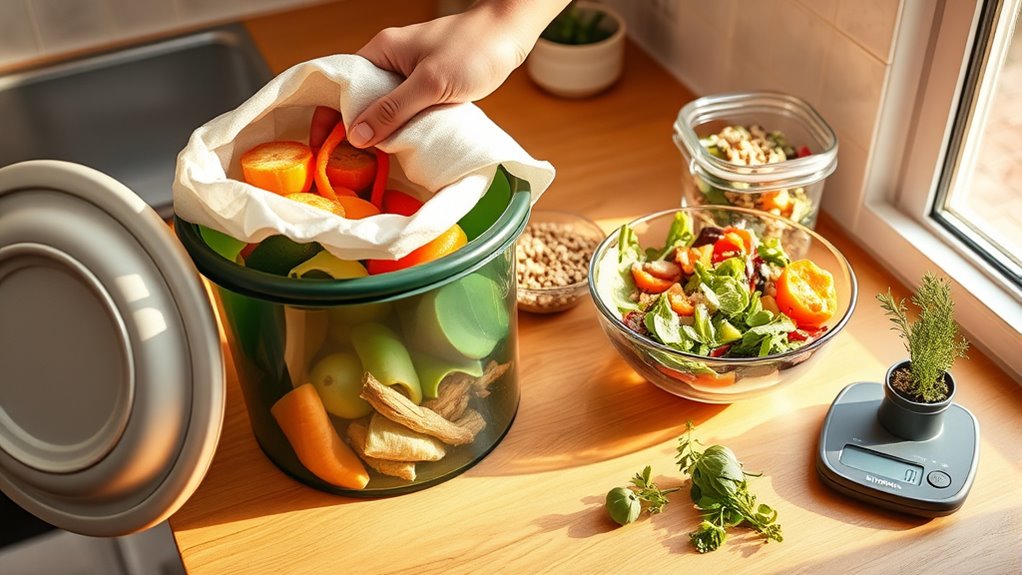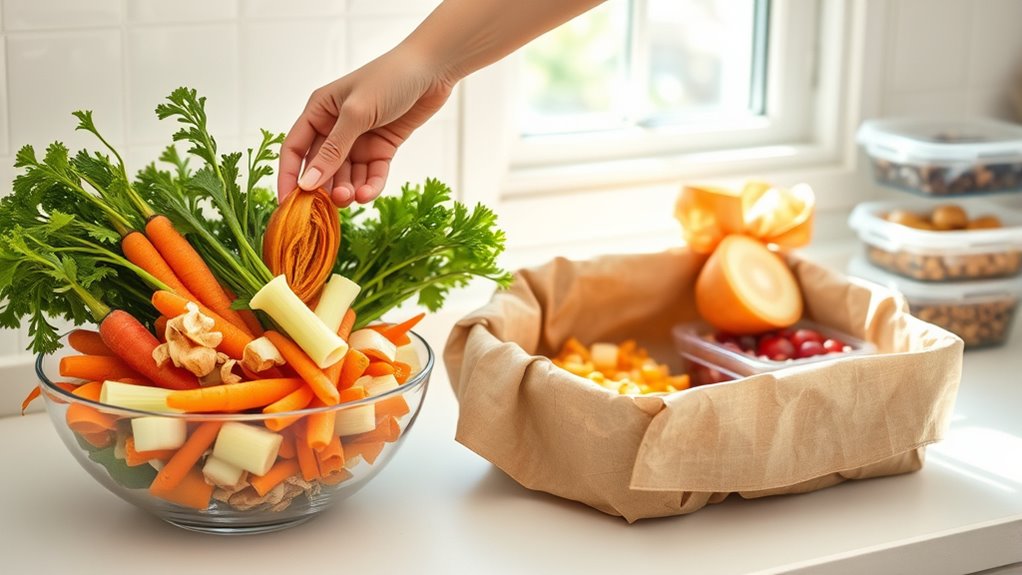To reduce food waste at home, focus on mindful habits like meal planning and shopping smartly to avoid overbuying. Use leftovers creatively and check your fridge before grocery trips. Compost food scraps such as peels and coffee grounds to cut down on landfill waste. Setting up a compost bin and maintaining it can make a big difference. Keep these tips in mind, and discover more ways to cut waste and help the environment.
Key Takeaways
- Practice meal planning to buy only necessary ingredients and minimize leftovers.
- Avoid impulsive grocery shopping by making a shopping list based on planned meals.
- Use leftovers creatively to prevent discarding edible food.
- Start composting food scraps like peels and coffee grounds to reduce waste and enrich soil.
- Regularly review pantry and fridge contents to prevent spoilage and over-purchasing.

Ever wonder how your household habits contribute to the staggering amount of food waste? It’s easy to overlook how small choices add up over time. One effective way to cut down on waste is through mindful meal planning. Instead of impulsively buying groceries or tossing leftovers, take a moment to map out what you’ll eat for the week. This helps you buy only what you need, reducing the chance of food spoilage. When you plan meals carefully, you also minimize the likelihood of cooking too much, which often leads to uneaten leftovers that eventually get tossed. Keep a list of essentials and check your fridge and pantry before heading to the store. Doing so ensures you don’t buy duplicates or items you already have, which can sit for too long and go bad. Meal planning also encourages you to get creative with ingredients, making the most of what you already have, instead of letting produce or perishables go to waste. Incorporating data analysis can help you better understand your household consumption patterns and identify areas to reduce waste more effectively.
In addition to planning, adopting composting practices can considerably reduce your household’s food waste. Composting allows you to turn food scraps—like vegetable peels, coffee grounds, eggshells, and fruit cores—into nutrient-rich soil for your garden or plants. Instead of throwing these scraps away, you create a closed-loop system that benefits your environment. It’s easy to start composting at home; you just need a designated bin, some browns (like dry leaves or shredded paper), and greens (food scraps). With proper maintenance, your compost will break down over time, reducing the amount of waste sent to landfills and helping curb methane emissions that come from decomposing food in landfills.

Utopia Kitchen Indoor Compost Bin Kitchen, Odorless Composting with Charcoal Filter, 1.3 Gallon Stainless Steel Large Composter for Countertop & Under Sink, Easy Cleaning, One Extra Filter – (Silver)
With this compost bin, you can let the scraps build up during the week without worrying about bad…
As an affiliate, we earn on qualifying purchases.
As an affiliate, we earn on qualifying purchases.
Frequently Asked Questions
How Can I Best Store Leftovers to Prevent Spoilage?
To keep leftovers fresh and prevent spoilage, you should store them properly. Use proper refrigeration by setting your fridge to the right temperature, ideally below 40°F (4°C). Transfer leftovers into airtight containers to keep out air and bacteria. Label and date them so you know how long they’ve been stored. This simple step helps maintain food quality, reduces waste, and keeps your leftovers safe to enjoy later.
What Are Creative Ways to Use Food Scraps?
Imagine you’re a pioneer in composting tricks, turning scraps into treasure. To use food scraps creatively, try blending vegetable peels into smoothies or making broth from vegetable ends. You can also experiment with creative recipes like banana peel muffins or herb-infused oils. Composting tricks help reduce waste, while these ideas give your leftovers a second life, saving money and helping the environment while satisfying your culinary curiosity.
How Do I Plan Meals to Minimize Waste?
To plan meals and minimize waste, start with a detailed shopping list based on your weekly meal prep. Stick to your list to avoid impulse buys that may go unused. Plan versatile meals that reuse ingredients, and batch cook to reduce leftovers. Check what you already have before shopping, and store food properly to extend freshness. This approach helps you use what you buy and cut down on unnecessary waste.
Are There Apps to Track and Reduce Household Food Waste?
You can find apps that help you track and reduce household food waste, making it easier to manage your groceries. A smart fridge with waste tracking features automatically monitors what you store and alerts you when items expire or are almost gone. These apps provide reminders, meal suggestions based on what you have, and help you plan better, ultimately cutting down on unnecessary waste and saving money.
What Are the Environmental Impacts of Food Waste?
Food waste is like a leaking faucet, draining resources and harming the environment. You should know that food waste statistics reveal millions of tons of food are discarded annually, contributing to ecological consequences like greenhouse gas emissions and water waste. When food decomposes in landfills, it releases methane, a potent greenhouse gas. By reducing waste, you help lower these impacts, protecting the planet’s health and conserving essential resources for future generations.

PRAKI Airtight Food Storage Containers Set with Lids – 24 PCS, BPA Free Kitchen and Pantry Organization, Plastic Leak-proof Canisters for Cereal Flour & Sugar – Labels & Marker
Bundle Set: This kitchen & pantry organizers and storage set comes with 24 containers, they are inlaid together,…
As an affiliate, we earn on qualifying purchases.
As an affiliate, we earn on qualifying purchases.
Conclusion
By planning meals carefully, storing food properly, and using leftovers creatively, you can markedly cut down on waste. By being mindful of expiration dates, by avoiding impulse buys, and by composting scraps, you turn small actions into big savings. Each step you take, each habit you build, each effort you make helps reduce waste, saves money, and protects the environment. Together, these choices create a cycle of sustainability, responsibility, and care—making your home a greener, cleaner place.

2 Pack Refrigerator Thermometer, 30-30°C/20-80°F, Classic Fridge Thermometer Large Dial with Red Indicator Thermometer for Freezer Refrigerator Cooler
Convenient and practical: Our refrigerator thermometer is suitable for traditional refrigerators, freezers, insulated boxes, etc. It has a…
As an affiliate, we earn on qualifying purchases.
As an affiliate, we earn on qualifying purchases.

52 PCS Food Storage Containers with Lids Airtight (26 Lids & 26 Containers)- Reusable Plastic Leakproof Meal-Prep Container for Kitchen Storage Organization Microwave/Dishwasher Safe with Labels & Pen
BPA-Free & Microwave & Freezer Safe: Made from upgraded food-grade plastic, our food storage containers are 100% BPA-free…
As an affiliate, we earn on qualifying purchases.
As an affiliate, we earn on qualifying purchases.









